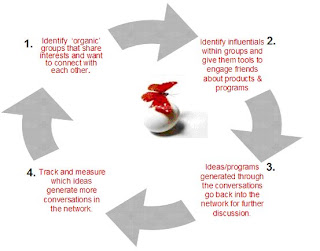
Social Marketing is done to achieve change. By that I mean change for the greater good. Calls for social campaigns to change public attitudes and behavior have been at the core of strategies to solve teenage pregnancy, drug and alcohol abuse, poor nutrition, and the spread of acquired immunodeficiency syndrome (AIDS). In contemporary societies, social marketing is an underutilized but powerful means of changing behavior. (Kotler, 1989)
Kotler states the five steps of social marketing:
1) Analyzing the social marketing environment;
2) Researching and selecting the target adopter population;
3) Designing social marketing strategies;
4) Planning social marketing mix programs; and
5) Organizing, implementing, controlling, and evaluating the social marketing effort.
These stages, says Kotler, is what differentiates social marketing form other efforts to influence changes in social ideas and practices. It entails scientific research into the needs and desires of people. Surely, PR practitioners do a lot of planning, analyzing and research, but it is not ‘scientific’ enough to be called ‘Social Marketing’.
Sean Kidney, social marketing professional was the guest lecturer. He argues that one of the best ways to achieve social change is to make it harder for people to the thing you are trying to change. That’s a whole ‘nother topic. Here I believe we are talking about changing laws and regulations. I am not quite sure how this is a PR practitioner’s role.
All throughout this lecture, I was wondering ‘what is my role as a communicator in social marketing’. Mr. Kennedy pointed out that 95% of communications campaigns are linear and therefore that makes no sense. He instead, proposed that PR practitioners focus on groups that will influence change. OH, so now I see. My role is to persuade or convince those who influence the target group? Hmmmm…why not influence them all or is this just the marketer’s way of using the PR practitioner? According to Kotler, a combination of traditional approaches to social change and advances in communication and marketing skills is necessary to achieve overall change. Oh well….. thats where I come in...the issue needs to be communicated!
References:
Kotler, P. Social Marketing: Strategies for changing Public Behavior
http://db.jhuccp.org/ics-wpd/exec/icswppro.dll?BU=http://db.jhuccp.org/ics-wpd/exec/icswppro.dll&QF0=DocNo&QI0=060591&TN=Popline&AC=QBE_QUERY&MR=30%25DL=1&&RL=1&&RF=LongRecordDisplay&DF=LongRecordDisplay
[Accessed Mar. 30, 2009]
Kotler states the five steps of social marketing:
1) Analyzing the social marketing environment;
2) Researching and selecting the target adopter population;
3) Designing social marketing strategies;
4) Planning social marketing mix programs; and
5) Organizing, implementing, controlling, and evaluating the social marketing effort.
These stages, says Kotler, is what differentiates social marketing form other efforts to influence changes in social ideas and practices. It entails scientific research into the needs and desires of people. Surely, PR practitioners do a lot of planning, analyzing and research, but it is not ‘scientific’ enough to be called ‘Social Marketing’.
Sean Kidney, social marketing professional was the guest lecturer. He argues that one of the best ways to achieve social change is to make it harder for people to the thing you are trying to change. That’s a whole ‘nother topic. Here I believe we are talking about changing laws and regulations. I am not quite sure how this is a PR practitioner’s role.
All throughout this lecture, I was wondering ‘what is my role as a communicator in social marketing’. Mr. Kennedy pointed out that 95% of communications campaigns are linear and therefore that makes no sense. He instead, proposed that PR practitioners focus on groups that will influence change. OH, so now I see. My role is to persuade or convince those who influence the target group? Hmmmm…why not influence them all or is this just the marketer’s way of using the PR practitioner? According to Kotler, a combination of traditional approaches to social change and advances in communication and marketing skills is necessary to achieve overall change. Oh well….. thats where I come in...the issue needs to be communicated!
References:
Kotler, P. Social Marketing: Strategies for changing Public Behavior
http://db.jhuccp.org/ics-wpd/exec/icswppro.dll?BU=http://db.jhuccp.org/ics-wpd/exec/icswppro.dll&QF0=DocNo&QI0=060591&TN=Popline&AC=QBE_QUERY&MR=30%25DL=1&&RL=1&&RF=LongRecordDisplay&DF=LongRecordDisplay
[Accessed Mar. 30, 2009]





No comments:
Post a Comment